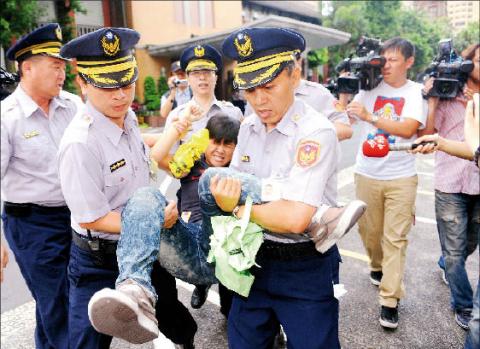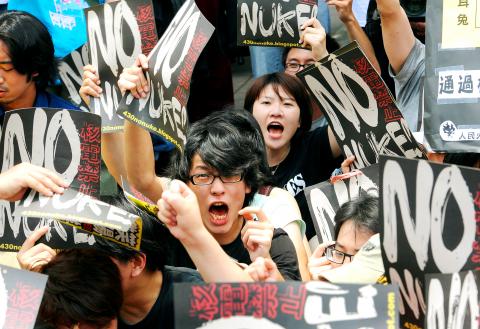The legislature yesterday voted down a set of anti-nuclear motions proposed by the Democratic Progressive Party (DPP).
Holding just one-third of the legislative seats, the DPP failed in 11 attempts to block the use of nuclear power, despite support from anti-nuclear activists who have staged a protest outside the legislature since Sunday night.
A motion to reject the request for a supplementary NT$14 billion (US$485.74 million) in funding from state-owned Taiwan Power Co (Taipower) for continued construction work at the Fourth Nuclear Power Plant in Gongliao (貢寮) District, New Taipei City (新北市), was defeated.

Photo: Chang Chia-ming, Taipei Times
Others motions that failed to pass during the session included one that called for construction of the plant to be suspended and a referendum held on whether the project should continue; another that the plant not be allowed to start trial operations using nuclear fuel before its ability to withstand earthquakes and tsunamis is enhanced, and a third calling on the government to promise not to extend the life of the three operating nuclear power plants.
The DPP also failed in an attempt to remove Daren (達仁), Taitung County, from a list of sites selected for nuclear waste disposal, as it is near active fault lines.
A request that the government re-evaluate the cost of electricity from nuclear power by factoring in the expense of dismantling nuclear power plants and -decontamination of polluted areas was also shot down.

Photo: Chang Chia-ming, Taipei Times
All 33 DPP lawmakers present chanted “Nuclear-free homeland; a sustainable Taiwan,” while one motion after another was voted down.
The Chinese Nationalist Party (KMT) presented counterproposals that demanded the nuclear power plants be subject to thorough safety inspections and new security measures be introduced at the plants. All the KMT proposals passed in the form of resolutions attached to the state-owned enterprises budget for this year.
After the vote, DPP lawmakers accused President Ma Ying-jeou (馬英九) of lacking the determination needed to achieve a nuclear-free homeland, an ideal clearly stipulated in the Environmental Basic Law (環境基本法) promulgated in 2002.
KMT Legislator Hsieh Kuo-liang (謝國樑) said the proposals made by his party would ensure the nuclear power plants met safety requirements, while ensuring the reduction of carbon dioxide emissions and guaranteeing a secure electricity supply.
With the passage of the additional NT$14 billion funding, the total now spent on the construction of the Fourth Nuclear Power Plant, which began in 1997, is NT$264.4 billion.
While the political drama unfolded inside the legislature, anti-nuclear protesters blocked the gates and the street in front of the building.
About 200 protesters had gathered in the morning to protest the government’s plan to continue construction work at the plant.
The protests were organized by Sunflower No Nuke Action, an anti-nuclear alliance made up of more than 40 civic groups, and joined by residents who live near the site of the plant.
Green Citizen Action Alliance secretary-general Tsuei Su-hsin (崔愫欣) said it was undemocratic for legislators to arbitrarily pass the huge budget when many of the details are kept secret from the public, not to mention barring citizens from observing the voting process from inside the legislature.
Green Party Taiwan spokesperson Pan Han-shen (潘翰聲) said that continuing construction at the plant was like throwing good money after bad, adding that the Control Yuan had already -condemned Taipower for more than 1,000 alterations it has made to the original plant design.
Pani (拔耐), an Aboriginal woman and cofounder of Raging Citizens Act Now, provided a clear picture of the implications of nuclear energy for ordinary citizens.
“I come from Taitung County, where nuclear waste is disposed and now live in Keelung, where I am surrounded by three nuclear power plants,” Pani said, adding that it was unfair for Aborigines, who usually consume less energy than other people in Taiwan, to be exposed to the dangers of coal mines in the past, and now nuclear waste.After casting divination moon blocks to determine the will of the Goddess Matsu, goddess of the sea, on Sunday, Gongliao residents brought a statue of Matsu from the main temple in Aodi Village (澳底) to the gates of the legislature.
“We asked if she was willing to come with us to Taipei to protest, and she told us she approved through the divination moon blocks,” Gongliao Anti-nuclear Self-Help Association chairman Wu Wen-chang (吳文樟) said.
“We have about 28 percent surplus electricity now and electricity generated by nuclear power only accounts for about 16 percent [of the nation’s output]. If nuclear power plants were shut down now, we would still have more than enough surplus electricity,” he said.
“So [Taipower], don’t lie to us. We have enough electricity,” he said.
During the nearly four-hour protest in soaring summer temperatures, tension rose when protestors tried to pull open and then climb over the gates to the legislature as they shouted their demands.
Skirmishes and calls of injustice erupted as protesters and police clashed, as those protesters who had been allowed to enter the legislature earlier in the morning to file a petition were escorted out by police officers.
“They kept us waiting in a small room and refused to tell us what was happening inside or allow us to meet legislators,” said Liu Nien-Yun (劉念雲), an organizer at the Taiwan Association for Victims of Occupational Injuries.
“We held up a banner at the doors of the legislative chamber, but were immediately dragged out by police,” Liu said.
When the result of the votes were announced to the crowd at midday, protesters obstructed traffic by lying in the road, claiming their actions simulated what would happen during a nuclear incident.
The groups said that although the budget had passed, their fight against nuclear power would continue.

NATIONAL SECURITY THREAT: An official said that Guan Guan’s comments had gone beyond the threshold of free speech, as she advocated for the destruction of the ROC China-born media influencer Guan Guan’s (關關) residency permit has been revoked for repeatedly posting pro-China content that threatens national security, the National Immigration Agency said yesterday. Guan Guan has said many controversial things in her videos posted to Douyin (抖音), including “the red flag will soon be painted all over Taiwan” and “Taiwan is an inseparable part of China,” while expressing hope for expedited “reunification.” The agency received multiple reports alleging that Guan Guan had advocated for armed reunification last year. After investigating, the agency last month issued a notice requiring her to appear and account for her actions. Guan Guan appeared as required,

A strong cold air mass is expected to arrive tonight, bringing a change in weather and a drop in temperature, the Central Weather Administration (CWA) said. The coldest time would be early on Thursday morning, with temperatures in some areas dipping as low as 8°C, it said. Daytime highs yesterday were 22°C to 24°C in northern and eastern Taiwan, and about 25°C to 28°C in the central and southern regions, it said. However, nighttime lows would dip to about 15°C to 16°C in central and northern Taiwan as well as the northeast, and 17°C to 19°C elsewhere, it said. Tropical Storm Nokaen, currently

‘NATO-PLUS’: ‘Our strategic partners in the Indo-Pacific are facing increasing aggression by the Chinese Communist Party,’ US Representative Rob Wittman said The US House of Representatives on Monday released its version of the Consolidated Appropriations Act, which includes US$1.15 billion to support security cooperation with Taiwan. The omnibus act, covering US$1.2 trillion of spending, allocates US$1 billion for the Taiwan Security Cooperation Initiative, as well as US$150 million for the replacement of defense articles and reimbursement of defense services provided to Taiwan. The fund allocations were based on the US National Defense Authorization Act for fiscal 2026 that was passed by the US Congress last month and authorized up to US$1 billion to the US Defense Security Cooperation Agency in support of the

PAPERS, PLEASE: The gang exploited the high value of the passports, selling them at inflated prices to Chinese buyers, who would treat them as ‘invisibility cloaks’ The Yilan District Court has handed four members of a syndicate prison terms ranging from one year and two months to two years and two months for their involvement in a scheme to purchase Taiwanese passports and resell them abroad at a massive markup. A Chinese human smuggling syndicate purchased Taiwanese passports through local criminal networks, exploiting the passports’ visa-free travel privileges to turn a profit of more than 20 times the original price, the court said. Such criminal organizations enable people to impersonate Taiwanese when entering and exiting Taiwan and other countries, undermining social order and the credibility of the nation’s